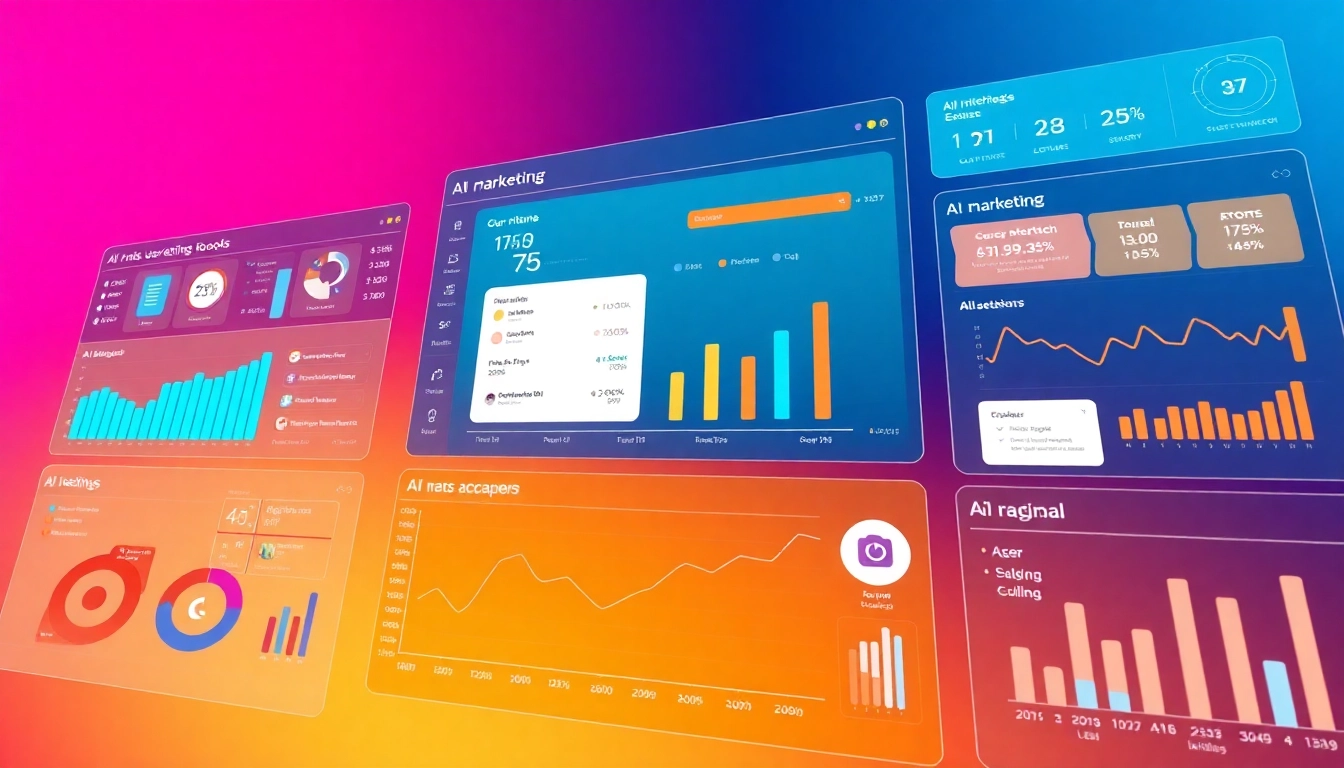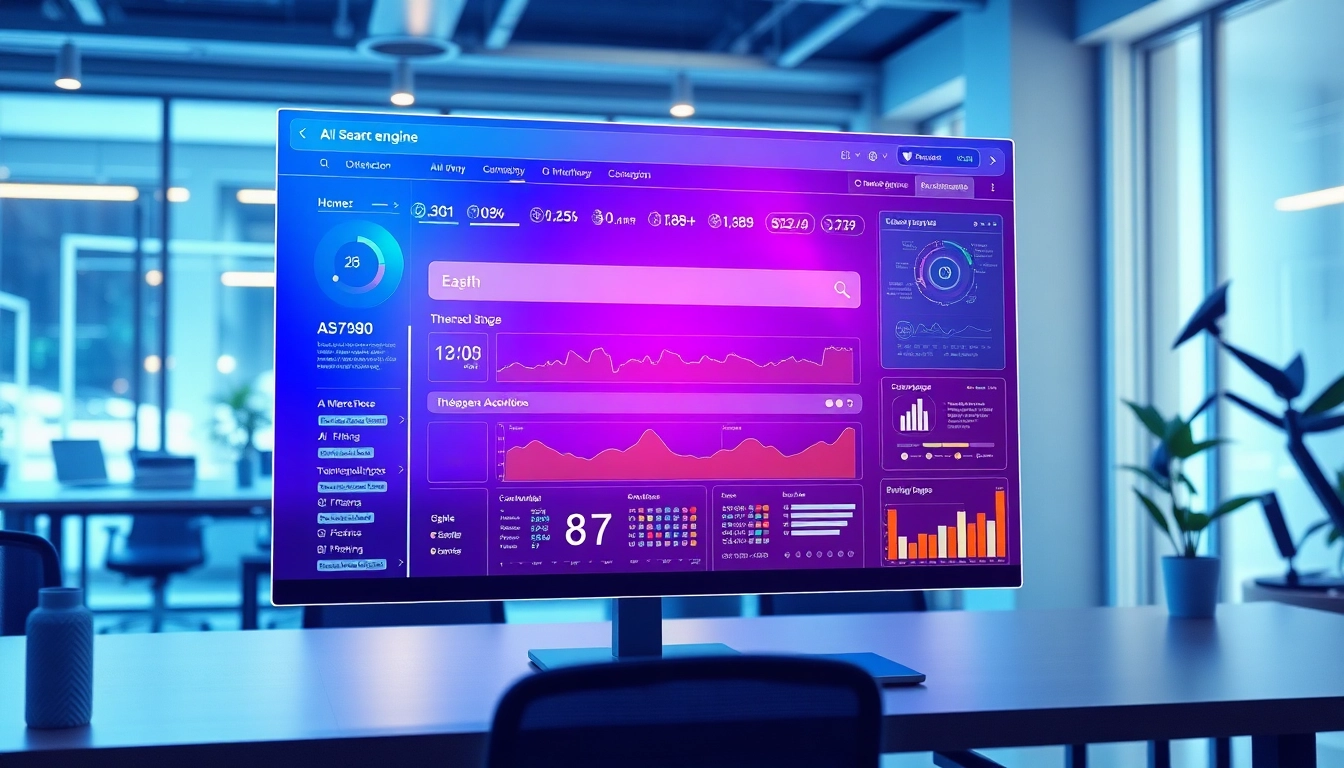
Introduction to AI Marketing Tools
In the rapidly evolving landscape of digital marketing, businesses are increasingly turning to innovative technologies to gain a competitive edge. One such innovation is the use of AI marketing tools, which are transforming the way companies engage with customers, analyze data, and create content. These tools leverage artificial intelligence to streamline marketing processes, enabling teams to operate more efficiently and effectively. In this article, we will explore what AI marketing tools are, the surge in their popularity, the various types available, and how businesses can select and implement the right tools to optimize their marketing strategies.
What Are AI Marketing Tools?
AI marketing tools encompass a wide range of software applications that utilize artificial intelligence (AI) to enhance marketing efforts. These tools can automate processes, provide data insights, personalize content, and improve customer engagement. By analyzing large datasets, AI marketing tools can identify patterns and trends, helping marketers make informed decisions regarding audience targeting, campaign performance, and user behavior.
The Rise of AI in Digital Marketing
The integration of AI in marketing is not a passing trend; it is a significant shift in the industry driven by the proliferation of data and the need for personalization. According to a report by Deloitte, 62% of organizations within predominantly marketing-focused industries have already adopted AI tools. This rise is fueled by the demand for improved customer experiences, as consumers increasingly expect tailored interactions with brands. From chatbots facilitating real-time customer service to predictive analytics guiding marketing strategies, AI is revolutionizing how brands connect with their audiences.
Key Benefits for Businesses
The utilization of AI marketing tools offers several advantages to businesses:
- Enhanced Efficiency: AI automates repetitive tasks such as data entry and customer segmentation, allowing marketers to focus on strategic initiatives.
- Data-Driven Insights: AI tools can analyze vast amounts of data quickly, providing actionable insights that help businesses understand customer preferences and behavior.
- Improved Customer Engagement: By utilizing AI to personalize content and communications, businesses can create more meaningful interactions with their customers.
- Cost Savings: Automating processes reduces the need for extensive manual labor, leading to lower operational costs.
- Scalability: AI tools can easily scale with your business, adapting to increasing amounts of data and user interactions without a proportional increase in workload.
Types of AI Marketing Tools
AI marketing tools come in various forms, each designed to address specific aspects of the marketing process. Below are some of the most common types of AI marketing tools available today:
Content Creation Tools
Content is king in the digital marketing realm, and AI-powered content creation tools are making it easier for marketers to produce high-quality material. These tools can generate blog posts, social media content, and marketing copy with remarkable speed and relevance. For instance, platforms like Jasper.ai use machine learning algorithms to understand context and generate written content that meets specific guidelines and tones. Additionally, they can help marketers brainstorm ideas, develop outlines, and even offer A/B testing options for different content formats.
Social Media Management Tools
AI tools in social media management streamline the planning, scheduling, and analysis of social media content. Tools such as Buffer and Hootsuite integrate AI to optimize posting times based on audience engagement patterns and generate content suggestions. They can also analyze performance metrics, providing insights into what types of content resonate best with followers, enabling marketers to refine their strategies for better results.
Data Analysis and Insights Tools
Data is at the heart of effective marketing, and AI tools designed for analysis assist businesses in interpreting large datasets to derive actionable insights. These tools can conduct customer segmentation, churn prediction, and sales forecasting with unparalleled accuracy. For example, platforms like HubSpot use AI to help marketers understand user behavior, segment audiences based on engagement data, and tailor marketing campaigns accordingly. By identifying key trends and anomalies, these tools empower marketers to make data-driven decisions that enhance ROI.
Finding the Right AI Marketing Tool for Your Needs
Choosing the right AI marketing tool is critical to ensuring that your investment yields a strong return. Here are some essential considerations to keep in mind while evaluating options:
Assessing Your Business Goals
Before selecting an AI marketing tool, clearly define your marketing objectives. Are you looking to enhance customer engagement, improve lead generation, or streamline data analysis? Aligning the tool’s capabilities with your specific goals will maximize its effectiveness. For example, if your focus is on enhancing customer service, a chatbot solution might be ideal, while a content generation tool would suit those seeking to scale content production.
Budget Considerations
Costs associated with AI marketing tools can vary significantly depending on features, scalability, and licensing models. While some tools operate on a subscription basis, others may require a one-time purchase or a usage-based pricing model. It’s essential to evaluate your budget against the tools’ ROI potential. Look for case studies or user testimonials that highlight success stories and performance metrics. Investing in a premium tool may yield better results compared to cheaper alternatives that lack essential features.
User Experience and Integration
A user-friendly interface can make a significant difference in the adoption and efficacy of your chosen AI marketing tools. Evaluate how intuitive the platform is and whether it provides ample training resources. Integration capabilities also matter; consider how well the tool aligns with existing systems, such as CRM software or eCommerce platforms. Tools that offer seamless integration often enhance data flow between systems and improve overall marketing efficiency.
Best Practices for Implementing AI Marketing Tools
Successfully implementing AI marketing tools requires a strategic approach. Here are some best practices to ensure a smooth transition and effective usage:
Starting Small with AI Solutions
When incorporating AI tools into your marketing strategy, it’s advisable to begin with small-scale implementations. Select one or two key areas where AI can make an immediate impact and test the waters. This cautious approach allows you to gather insights, make adjustments, and build a foundation for more extensive implementations over time. For example, begin with a content generation tool for blogs and gradually expand to social media or email marketing as you gain confidence in its capabilities.
Measuring Success and Adjustments
Once AI marketing tools are in place, regularly measure their performance against predefined KPIs. Look at engagement metrics, conversion rates, and ROI to assess their impact. Use analytics dashboards to visualize trends and track progress. If certain tactics are underperforming, don’t hesitate to make necessary adjustments. Harnessing the flexibility of AI tools can help you refine your strategies and improve effectiveness over time.
Staying Updated with Industry Trends
The digital marketing landscape is continually evolving, with new AI technologies emerging regularly. To fully leverage AI marketing tools, it is crucial to stay informed about the latest developments. Subscribe to industry newsletters, follow relevant blogs, and participate in webinars or conferences to enhance your understanding of evolving trends. Engaging with thought leaders in the field can provide insights into best practices and innovative strategies that can be incorporated into your marketing plans.
Future Trends in AI Marketing Tools
The future of AI marketing tools looks promising as technology continues to advance. Here are some emerging trends that businesses should watch:
Emerging Technologies to Watch
As AI technology evolves, new tools and features will emerge to enhance marketing capabilities. For example, natural language processing (NLP) and machine learning algorithms will further improve predictive analytics, making it easier for marketers to anticipate customer needs. Additionally, the integration of augmented reality (AR) and virtual reality (VR) into AI marketing tools could revolutionize customer engagement and experience.
The Impact of Machine Learning
Machine learning is a subset of AI that enables systems to learn and improve from experience without being explicitly programmed. This technology plays a crucial role in analyzing customer behavior and providing tailored recommendations in real-time. Marketers will increasingly leverage machine learning to optimize campaigns, targeting specific customer segments with personalized content, thus enhancing customer satisfaction and loyalty.
Integrating AI with Existing Strategies
As AI marketing tools mature, their integration with existing marketing strategies will become essential. Marketers must adopt a holistic approach to utilize AI effectively within their current frameworks. This could include integrating AI tools with marketing automation platforms, CRM systems, and content management systems to provide a seamless flow of data and information. The synergy created from these integrations can lead to more effective campaigns and improved customer journeys.
Conclusion
AI marketing tools are rapidly emerging as game-changers for businesses aiming to elevate their marketing strategies. With enhanced efficiency, data-driven insights, and improved customer engagement, these tools are essential for staying competitive in today’s digital landscape. By understanding the various types of AI tools available, carefully assessing individual business needs, and implementing best practices, marketers can harness the power of AI to drive meaningful results. As the future of AI in marketing continues to unfold, staying informed and adaptable will be key to leveraging these technologies to their fullest potential.







